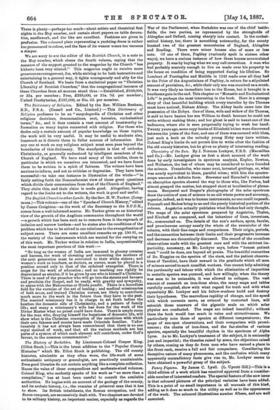The History of Berkshire. By Lieutenant-Colonel Cooper King. (Elliot Stock.)—This
is the latest addition to the "Popular County Histories" which Mr. Elliot Stock is publishing. The old county histories, admirable as they often were, the life-work of some enthusiastic antiquary or genealogist, are practically unattainable. Even good libraries do not contain anything like a complete collection. Hence the value of these compendious and moderate-sized volumes. Colonel King, who modestly speaks of his work as " no more than a compilation," has at least been careful to consult the available authorities. He begins with an account of the geology of the county, and its archaic history, i.e., the remains of primeval man that it has to show. Its British inhabitants, the Roman occupation, and the Saxon conquest, are successively dealt with. Two chapters are devoted to its military history, an important matter, especially an regards the War of the Parliament, when Berkshire was one of the chief battle- fields, the two parties, as represented by the strongholds of Abingdon and Oxford, coming sharply into contact. In the ecclesi- astical history, too, there is something noteworthy, for the county boasted two of the greatest monasteries of England, Abingdon and Reading. There were minor houses also of more or less note. Of one of them, Poghley (variously spelt in sixteen other ways), we have a curious instance of how these houses accumulated property. It was by baying what we may call reversions. A man who had probably scarcely enough to live on made over hie property to the house on condition of being supported daring his lifetime. So Lambert of Farringdon and Matilda in 1242 made over all they had to the Prior of the Angustinians of Poghley, in return for a stipulated amount of provisions, Fee., while their only son was received as a monk. It was very likely an immediate loss to the House, but it brought in a handsome gain in the end. This chapter on "Monastic and Ecclesiastical Life" is perhaps the most interesting in the book. Here is a strange story of that beautiful building which every traveller by the Thames must have noticed, Bisham Abbey. The Abbey lands came into the possession of the Robyn. One of them, wife and widow of Sir Thomas, Is said to have beaten her eon William to death because he could not write without making blots ; and her ghost is said to haunt one of the bedrooms, where she is seen perpetually trying to wash her hand. Twenty years ago, some copy-books of Elizabeth's time were discovered between the joists of the floor, and one of them was covered with blots, just such a book as the unlucky young Hoby may have written. Colonel King's limits do not permit him to write after the fashion of the old county histories, but he gives us plenty of interesting reading.


































 Previous page
Previous page